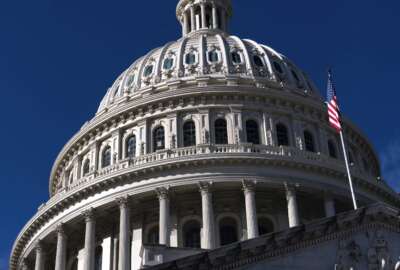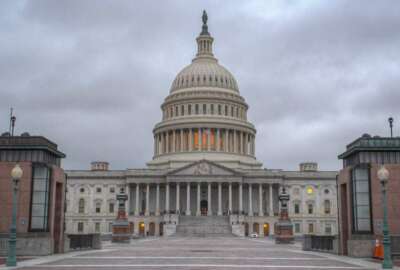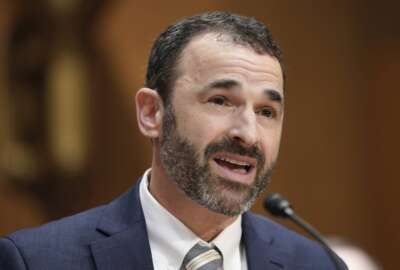‘Federally Employed Women’ would like a thing or two from Congress
While the threat of a partial government shutdown still looms, one group of federal employees has a message for Congress. Find a way past it. That is, in part, what...
While the threat of a partial government shutdown still looms, one group of federal employees has a message for Congress. Find a way past it. That is, in part, what concerns Federally Employed Women (FEW). For more, the Federal Drive with Tom Temin spoke with Pamela Richards, FEW’s president.
Interview Transcript:
Tom Temin And FEW is saying, and you’re saying that a government shutdown doesn’t necessarily affect everyone equally because women have concerns sometimes that men don’t.
Pamela Richards Correct. Absolutely.
Tom Temin Well, tell us more.
Pamela Richards Yes. So, with the government shutdown, it affects women because some women with the single parent households, they are affected by possibility of furlough, possibility of not being able to take care of their financial responsibilities, not being able to take care of the childcare, for the for their child. So, it affects a lot when it comes to our women and our membership.
Tom Temin So what’s your message to Congress then? What would you have them do?
Pamela Richards So one thing we would like for them to do is, as you already stated is to move past it and pass a budget that will allow for us to continue to work as, federally employed women. Last fall, FEW submitted a request to Congress imploring them to act on one of their options to end the entire annual government shutdown process. And at that time, there was several, avenues put forward to get rid of those temporary stopgaps, get rid of the whole shutdown conversation. And obviously that did not happen, but we would love for a bipartisan agreement to take place to end the government shutdown. And I cannot speak for all federal managers, but I am certain that, many would agree with me on this or Federally Employed Women on that.
Tom Temin And a lot of federally employed women are not managers, and therefore they are at the lower levels of the pay scale. And that’s much more disproportionately difficult for people that don’t earn that much to be out of work, even though the paycheck will come eventually during the time there is no paycheck. It can be really difficult.
Pamela Richards Right, right. And those that are, let’s say at the bottom of the totem pole, which are lower-level GS workers, this has created, a heavy financial impact on them. A burden for them as it relates to having to worry about a government shutdown from year to year.
Tom Temin And now, of course, the government will be in a fresh continuing resolution, this one lasting till March, operating under the CR year after year. That’s I think the general public doesn’t understand why that’s difficult for those trying to keep the government operating on a day-to-day basis. Tell us how it affects things.
Pamela Richards I’ll look at it from a human capital piece. Every day, the federal government employees work hard to run the operations and regardless of the political climate, putting their livelihoods on the line is unconscionable. There are two different deadlines that are affecting two sets of workers, and they are associated with budgets. This creates major inequities. As you watch, operations unfold. In a shutdown, federal agencies must discontinue all non-essential discretionary functions until funding legislation is passed and signed into law. Essential services continue to function, as do mandatory spending programs. So, shutdowns force agencies to draft and redraft budget plans. These are not minor undertakings we all talk about eliminate waste and wasteful processes. No one is talking about waste of time and other resources that comes with these financial gymnastics we do whenever we approach a government shutdown.
Tom Temin Now the CR, though a means that you can’t do anyhow what you had budgeted for and spent all that time planning for in the 18 months prior to when you thought a budget would start, but instead you got a CR. So, your kind of operating like last year.
Pamela Richards Correct. And this takes the government out of the opportunity of competing and saving on different services and resources by not being available and not having those funds available.
Tom Temin And so what else is on FEW’s mind these days?
Pamela Richards Well, FEW’s mind is preparing our membership and being able to listen to our membership and what issues that concerns them. Being able to share with congressional representatives that, you know, when women have lost their jobs, even in a, temporarily, a greater risk of other things could happen. Such an increase in gender-based violence, struggles with their mental health if they’re out having to worry about work. Many women are running, like I stated earlier, single parent households and there’s no safety net for anyone that’s living from paycheck to paycheck. So, we’re looking for the government to, you know, continue to work toward a bipartisan agreement, right. And do it quickly and not put the jeopardy in the lives of our membership or federal employees with not being able to receive their paychecks from year to year.
Tom Temin Pamela Richards, a supervisory analyst at the Government Accountability Office, is president of Federally Employed Women. FEW. Thanks so much for joining me.
Pamela Richards Thank you. Thank you for the opportunity to be here. Tom, as always, we appreciate what you do to support federally employed women and getting our voices out there. Take care sir.
Copyright © 2025 Federal News Network. All rights reserved. This website is not intended for users located within the European Economic Area.
Tom Temin is host of the Federal Drive and has been providing insight on federal technology and management issues for more than 30 years.
Follow @tteminWFED






